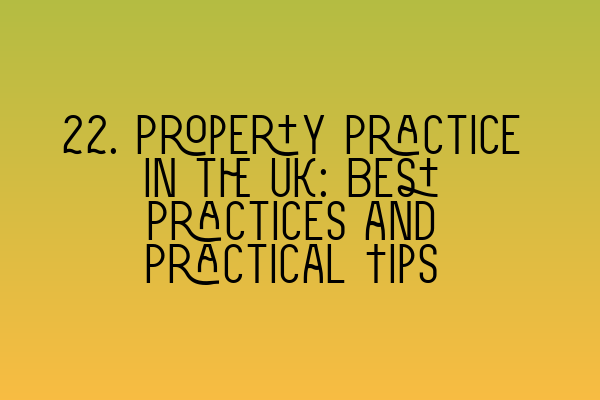Welcome to the blog of SQE Property Law & Land Law! In today’s post, we will be discussing property practice in the UK and sharing some best practices and practical tips to help you navigate this complex area of law. Whether you are a solicitor, a property owner, or someone looking to buy or sell property, this post is for you.
Before we dive into the details, let’s first make sure we are on the same page. Property practice refers to the legal practice involving all aspects of property law, including the buying, selling, leasing, and management of real estate. It is a crucial area of law that requires expertise and attention to detail.
Now, let’s explore some best practices and practical tips that can make property practice in the UK a smoother experience:
1. Stay Up-to-Date with Changes in Property Law
Property law is constantly evolving, with new legislation and case law shaping its landscape. As a property practitioner, it is crucial to stay up-to-date with these changes to ensure you are providing accurate and effective advice to your clients. Regularly reading legal publications, attending seminars, and participating in professional development courses can help you stay ahead.
2. Conduct Thorough Due Diligence
When dealing with property transactions, it is essential to conduct thorough due diligence. This means investigating and reviewing all relevant documents, such as title deeds, leases, surveys, and planning permissions, to ensure there are no hidden issues or risks. By conducting thorough due diligence, you can protect your clients’ interests and avoid potential disputes or legal challenges down the line.
3. Communicate Clearly with Clients
Effective communication is key in any legal practice, and property law is no exception. Make sure to clearly communicate with your clients, explaining the legal processes, risks, and potential outcomes associated with their property matters. Adapting your communication style to match your clients’ understanding and needs can help build trust and ensure all parties are on the same page throughout the transaction.
4. Draft Clear and Comprehensive Documentation
Property transactions often involve a significant amount of paperwork, such as contracts, leases, and agreements. Drafting clear and comprehensive documentation is crucial to accurately reflect the parties’ intentions and protect their legal rights and obligations. Carefully review and proofread all documents to avoid any ambiguities or errors that could lead to disputes.
5. Collaborate with Experienced Professionals
Property practice often requires collaboration with other professionals, such as surveyors, valuers, and mortgage brokers. Building a network of trusted and experienced professionals can enhance your property practice and provide valuable resources and support. Be sure to establish clear lines of communication and work together to achieve the best outcomes for your clients.
6. Embrace Technology
In the digital age, incorporating technology into your property practice can streamline processes, improve efficiency, and enhance client experience. From using case management systems to storing documents securely in the cloud, embracing technology can help you stay organized, save time, and provide a seamless service to your clients.
7. Prioritize Continuing Professional Development
Property law is a dynamic field, so it’s important to prioritize continuing professional development (CPD) to enhance your knowledge and skills. Participating in property law courses, webinars, and workshops can provide valuable insights and keep you updated with the latest legal developments. Check out our SQE 1 Practice Exam Questions and SQE 1 Practice Mocks FLK1 FLK2 courses to boost your preparation for the SQE exams.
Conclusion
Property practice in the UK can be complex, but by following these best practices and practical tips, you can navigate the challenges and provide excellent service to your clients. Stay up-to-date with changes in property law, conduct thorough due diligence, communicate clearly, draft comprehensive documentation, collaborate with experienced professionals, embrace technology, and prioritize continuing professional development. By implementing these strategies, you can enhance your property practice and achieve successful outcomes for your clients.
For more information on our SQE preparation courses, such as our SQE 2 Preparation Courses and SQE 1 Preparation Courses, visit our website. Stay tuned for more insightful articles from SQE Property Law & Land Law!
And don’t forget to check out the latest SRA SQE Exam Dates! Good luck with your property practice endeavours!
